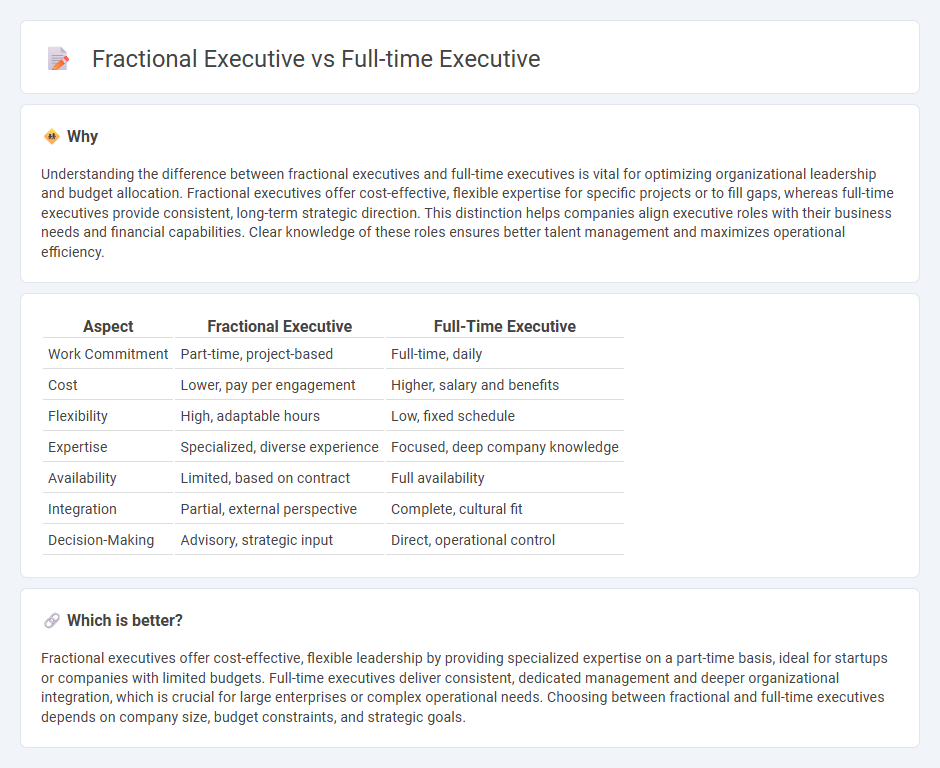
Fractional executives provide specialized leadership on a part-time or project basis, offering cost-effective expertise for companies needing strategic guidance without committing to full-time salaries. Full-time executives dedicate their entire professional focus to the organization's operations and long-term goals, ensuring continuous oversight and alignment with corporate objectives. Explore the advantages and applications of fractional versus full-time executives to optimize your company's leadership strategy.
Why it is important
Understanding the difference between fractional executives and full-time executives is vital for optimizing organizational leadership and budget allocation. Fractional executives offer cost-effective, flexible expertise for specific projects or to fill gaps, whereas full-time executives provide consistent, long-term strategic direction. This distinction helps companies align executive roles with their business needs and financial capabilities. Clear knowledge of these roles ensures better talent management and maximizes operational efficiency.
Comparison Table
| Aspect | Fractional Executive | Full-Time Executive |
|---|---|---|
| Work Commitment | Part-time, project-based | Full-time, daily |
| Cost | Lower, pay per engagement | Higher, salary and benefits |
| Flexibility | High, adaptable hours | Low, fixed schedule |
| Expertise | Specialized, diverse experience | Focused, deep company knowledge |
| Availability | Limited, based on contract | Full availability |
| Integration | Partial, external perspective | Complete, cultural fit |
| Decision-Making | Advisory, strategic input | Direct, operational control |
Which is better?
Fractional executives offer cost-effective, flexible leadership by providing specialized expertise on a part-time basis, ideal for startups or companies with limited budgets. Full-time executives deliver consistent, dedicated management and deeper organizational integration, which is crucial for large enterprises or complex operational needs. Choosing between fractional and full-time executives depends on company size, budget constraints, and strategic goals.
Connection
Fractional executives provide specialized leadership on a part-time or project basis, complementing the full-time executives' ongoing strategic roles within an organization. Both collaborate to align business goals, with fractional executives offering flexibility and cost efficiency while full-time executives maintain day-to-day operational control. This hybrid model enhances decision-making agility and resource allocation in dynamic business environments.
Key Terms
Commitment Level
Full-time executives dedicate 40+ hours per week to a single organization, ensuring deep involvement in daily operations and long-term strategic planning, while fractional executives allocate a portion of their time across multiple companies, offering high-level expertise without constant presence. Commitment level fundamentally differentiates these roles: full-time executives are embedded team members driving continuous growth, whereas fractional executives provide flexible, project-specific leadership with less organizational immersion. Discover how aligning executive commitment with your business needs can optimize leadership impact.
Compensation Structure
Full-time executives typically receive a fixed annual salary combined with bonuses, stock options, and comprehensive benefits, aligning their compensation with long-term company performance. Fractional executives are paid based on part-time engagement, often through hourly rates or retainer fees, which offers cost-efficiency and flexibility for startups and SMBs. Explore how different compensation structures impact executive roles and company dynamics in varied business models.
Decision-Making Authority
Full-time executives hold comprehensive decision-making authority aligned with long-term organizational goals, ensuring consistent leadership and accountability. Fractional executives provide targeted strategic input and decision-making for specific projects or functional areas, delivering expertise without full-time responsibility. Explore how these distinct roles impact your company's leadership and strategy execution.
Source and External Links
EMBA vs MBA: Which is Right for You? - An executive MBA (EMBA) is designed for experienced professionals who continue working full-time while studying part-time, unlike full-time MBA students who leave their jobs to attend school full-time.
B-School Options: EMBA vs. Part-time MBA vs. Full-time MBA - Executive MBA and part-time MBA programs allow students to keep their full-time jobs and salary while gaining a graduate degree, offering flexibility such as weekend classes and accelerated options to balance work and study.
How to Balance an EMBA While Working Full-Time | Wharton - EMBA students learn time management and work with supportive employers to successfully balance full-time work with rigorous Executive MBA studies.
 dowidth.com
dowidth.com